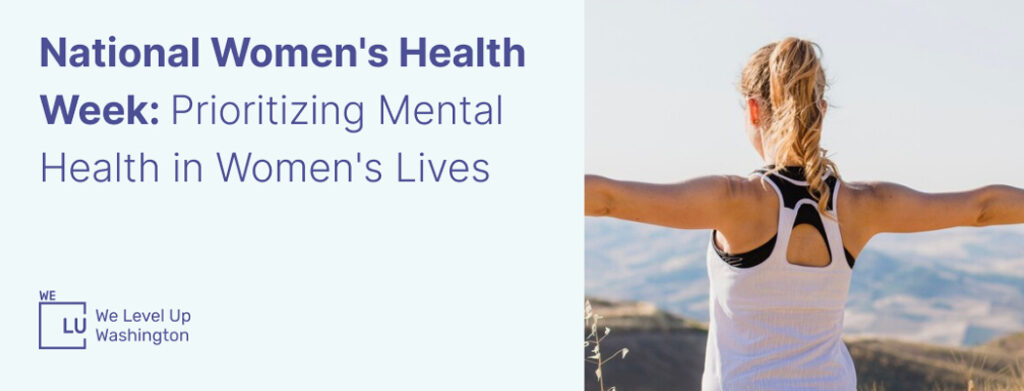National Women’s Health Week is an initiative set to remind us all of the importance of comprehensive health awareness among women. Women tend to take on many roles in society, from being daughters and friends to being mothers and wives to a variety of professional roles. It´s a challenge to balance all these roles while remaining happy and healthy. Women often forget about their own needs while prioritizing the needs of others, and more often than not, mental health deteriorates.
With this in mind, Women’s Health Week in 2024, with its topic Empowering Women, Cultivating Health: Celebrating Voices, Wellness, and Resilience, intends to highlight the nurturing of health and its complexity. It invites women to prioritize themselves, empower themselves, and take care of themselves on a daily basis. Whether that involves changing routines and adopting healthier habits or seeking help outside your immediate social circle and among professionals, women ought to strive for their own life satisfaction and overall health.
We Level Up Washington joins this year´s National Women’s Health Week in US by raising awareness about female mental health and pointing out the many challenges women face. We invite you to explore this article for information about factors impacting women´s mental health and preventive measures that can be taken to avoid mental health issues. We will share resources and inputs anyone can rely on to support women in their environment.
Skip To:
Common Mental Health Challenges for Women
Gender differences are frequently explored topic, and experts from the American Psychological Association warn about some mental disorders being more prevalent or exclusively a women´s problem. Research consistently shows that depression and anxiety are more prevalent in women, and postpartum depression and its specificities only fairly recently started getting attention from professionals.

Depression and suicide rates related to it are becoming a significant problem, and according to neuroscience research, depression has the third highest global burden of disease. The US Office on Women’s Health points out that women are twice as likely to suffer from depression compared to men. Finally, the Substance Abuse and Mental Health Service Administration (SAMHSA), with its yearly surveys, shows that around one-third of women suffering from serious mental illness do not seek help.
Psychologists explain this occurrence with many factors more typical for women, like biological factors (e.g., differences in hormonal status), social factors (socially imposed roles and expectations), and psychological factors (female tendency to ruminate and experience more negative feelings).
Postpartum depression is a specific type of depression requiring more attention as it is known to impact a child´s development as well. It is often related to postpartum PTSD, a topic that has only been recently introduced. In many cases, it goes unnoticed, as it is often considered normal to experience some negative emotions after childbirth. And although feeling some postpartum blues is perfectly normal, having prolonged negative feelings is something to address.

Do not ignore signs of mental problems but rather join the National Women’s Health Week mission by learning how to help a family member with mental illness.
Factors Affecting Women’s Mental Health
There are a variety of factors that impact women differently than men, resulting in different or more intense struggles with mental health. These factors can be grouped into biological, societal, and psychological ones.
Get Help. Get Better. Get Your Life Back.
Searching for Accredited Dual Diagnosis Mental Health Centers Near You?
Even if therapy failed previously, or are in the middle of a difficult crisis, we stand ready to support you. Our trusted behavioral health specialists will not give up on you. When you feel ready or just want someone to speak to about counseling alternatives to change your life call us. Even if we cannot assist you, we will lead you to wherever you can get support. There is no obligation. Call our hotline today.
FREE 24/7 Dual Diagnosis Mental Health Services HotlineBiological Factors
Hormonal changes women experience throughout their lives make them more sensitive to certain conditions and treatments but also contribute to different manifestations of conditions that are common in both men and women (e.g., ADHD). There are also life events only women can experience, such as pregnancy and menopause, that affect their mental state and can even result in serious mental disorders.
Societal Factors
These factors are related to the way women have been socialized compared to men. In many societies and communities, women are still taught that household responsibilities and raising children are exclusively their obligations. They are also expected to take care of their and their spouse´s aging parents. Equal women’s rights advocates are warning that this is a form of invisible work and that it should have the same status as being employed.
Women today also take on professional roles, and more than men face discrimination. Knowing they´ll have other roles to dedicate themselves to, they are often overlooked for promotions and encounter obstacles known as the glass ceiling. The topic of mental health in the workplace deserves special attention, but it´s undoubtedly connected with National Women’s Health Week’s focus on female empowerment.
Psychological Factors
By psychological factors, we can encompass not only the way women think and feel but also the likelihood of experiencing potentially traumatizing events. Literature shows that women are more likely to experience post-traumatic stress disorder (PTSD) compared to men, and the estimation in the US is that around 5% of men and 10% to 12% of women will suffer from it.
End the Emotional Pain. Get Your Life Back.
Feeling Depressed, Anxious or Struggling with Mental Health Illness? Get Safe Comfortable Mental Health Dual Diagnosis High-Quality Therapy From Counselors That Care. Begin Your Recovery Now.
Hotline: (509) 348-4077

Professionals also point out differences in how men and women think or how they solve issues. Women tend to overthink and ruminate, contributing to anxiety and depressive feelings. Switching to an outside coping mechanism—finding an enjoyable activity to engage in—can significantly improve mood and prevent that negative loop of feelings and thoughts. Wellness should be considered part of women´s health, which is the message of National Women’s Health Week in 2024, and should also become a part of the female mindset.

Preventive Measures and Healthy Practices to Introduce During Women’s Health Week in 2024
There are small things you can do to improve your overall health, but especially your mental health. Including them in your daily routine would mean living those goals set by the National Women’s Health Week in US for 2024. Sometimes, introducing one healthy habit can make all the difference, and here are some you can start practicing today:
- Schedule regular mental check-ups. Even if you have a supportive environment, friends and family you can turn to for advice or help, having an outside-of-the-circle professional can help you gain new insights and recognize problems that do not seem that obvious. Introducing regular check-ups can ensure you are not avoiding, but rather dealing with mental health issues in a timely manner.
- Practice stress management techniques. Learning to breathe in a specific way or how to calm yourself down during an anxiety attack can be very helpful in daily life. Well-developed mindfulness techniques now do wonders for emotion regulation and can aid you in addressing everyday stressors. These practices might become part of an activity (e.g., yoga), but they are also just a practice implemented in daily functioning.
- Work on developing a healthy lifestyle. A healthy diet or exercise schedule is good for your physical and mental health. It aids both body and mind and makes us more resilient. Developing a healthy sleeping pattern is another significant way to address stress and empower your organism.
Comfortable Facilities & Amenities
High-Quality Mental Health Services & Behaviroal Health Substance Abuse Treatment
Rehab Centers TourRenowned Mental Health Centers. Serene Private Facilities. Inpatient Rehab Programs Vary.
Mental Health Helpline: (509) 348-4077Proven recovery success experience, backed by a Team w/ History of:
15+
Years of Unified Experience
100s
5-Star Reviews Across Our Centers
10K
Recovery Success Stories Across Our Network
- Low Patient to Therapist Ratio
- Comprehensive Dual-Diagnosis Treatment
- Complimentary Family & Alumni Programs
- Coaching, Recovery & Development Events
- Comfortable Onsite Medical Detox Center
Resources and Support Systems
If you find yourself in a situation where you need extra assistance or professional advice, there are different options you can rely on. Some benefit from having a one-on-one conversation, so seeking a counselor or therapist can be the way to go. Others might feel more comfortable in a group of like-minded people or those who experience similar problems in their lives. In that case, a support group could be the most beneficial way to help your mental health.
However, if your situation is more serious, and you would like to put your trust in a facility, We Level Up Washington will for sure pop up when you´re searching mental health centers near me. We are a premier mental health center offering services for a variety of mental health disorders. We rely on evidence-based approaches and tailor our programs to the needs and requirements of our clients. With our dual-diagnosis treatment, we are able to address co-occurring conditions and ensure that all National Women’s Health Week goals are met.

Why Is National Women’s Health Week in US Important?
Initiatives like National Women’s Health Week are important reminders to take care of women in our environment. They are under a lot of pressure, constantly working to make everyone else feel good, and, in the process, often forgetting about themselves. Often, their mental health suffers, and with that, the whole society suffers as well.
This National Women’s Health Week, be an advocate for female health. Educate others on what it´s like living with someone with mental illness and break the stigma of mental illness. Encourage women in your environment to seek help and find the time for themselves. Take a holistic approach to your health and the health of those around you. Nurture your body, mind, and spirit.
World-class, Accredited, 5-Star Reviewed, Effective Mental Health Dual Diagnosis Programs. Complete Integrated Inpatient Rehab with Free Post Discharge Therapy Planning.
Hotline: (509) 348-4077End the Emotional Pain Rollercoaster. Gain Stability & Happiness Through Recovery Treatment. Start Mental Health Counseling Today. Get Free No-obligation Guidance by Behaviroal Health Specialists Who Understand Mental Health Recovery.
Experience Transformative Recovery at the We Level Up Treatment Center.
See our authentic success stories. Get inspired.
Get the help you deserve.



Start a New Life
Begin with a free call to a behavioral health treatment advisor. Learn more about our dual-diagnosis programs. The We Level Up treatment center network delivers recovery programs that vary by each treatment facility. Call to learn more.
- Personalized Care
- Caring Accountable Staff
- World-class Amenities
- Licensed & Accredited
- Renowned w/ 5-Star Reviews
We’ll Call You
Sources:
Solomon, S D, and J R Davidson. “Trauma: Prevalence, Impairment, Service Use, and Cost.” The Journal of Clinical Psychiatry, vol. 58 Suppl 9, 1 Jan. 1997, pp. 5–11, europepmc.org/article/med/9329445. Accessed 9 May 2024.
Brand, Bethany. “Trauma and Women.” Psychiatric Clinics of North America, vol. 26, no. 3, Sept. 2003, pp. 759–779, https://doi.org/10.1016/s0193-953x(03)00034-0. Accessed 4 Dec. 2019.
“2020 National Survey on Drug Use and Health: Women.” Substance Abuse and Mental Health Services Administration, Substance Abuse and Mental Health Services Administration, 27 July 2022, www.samhsa.gov/data/report/2020-nsduh-women.
“Depression.” Womenshealth.gov, 26 Dec. 2018, www.womenshealth.gov/mental-health/mental-health-conditions/depression.
Albert, Paul. “Why Is Depression More Prevalent in Women?” Journal of Psychiatry & Neuroscience, vol. 40, no. 4, 1 July 2015, pp. 219–221, www.ncbi.nlm.nih.gov/pmc/articles/PMC4478054/, https://doi.org/10.1503/jpn.150205.
Eaton, Nicholas R. “Study Finds Sex Differences in Mental Illness.” American Psychological Association, 2011, www.apa.org/news/press/releases/2011/08/mental-illness.





